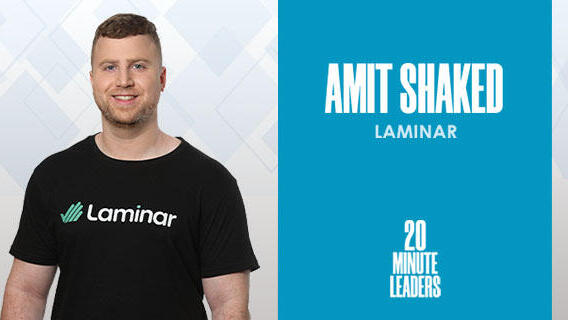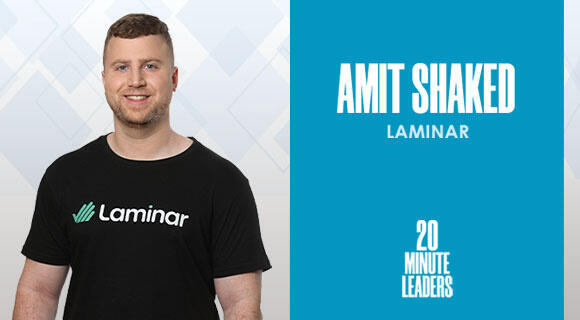
20-Minute Leaders
“Trying to be the best version of myself has always been my blessing and my curse.”
At a young age, co-founder and CEO of Laminar Amit Shaked says he was taught to strive to be the best version of himself.
At a young age, Amit Shaked says he was taught to strive to be the best version of himself. He shares that this is harder than trying to be better than others or even good at what you do. This led to him deciding very early on that he would found his own company. He explains that he didn’t really understand entrepreneurship or the sacrifices involved at the time. Shaked met his future co-founder during high school, and once they had an idea they felt would change the world, they quit their jobs and founded Laminar, where Shaked is now CEO. Laminar offers data security for the cloud, which he shares is crucial because many companies today can’t answer basic questions about where their data is and how it is protected in the cloud. Laminar is shaping a new market, he says, which offers high risks and high rewards.
Click Here For More 20MinuteLeaders
You are working on some really cool stuff with Laminar. Tell me how this whole thing started.
It goes all the way back to the house I grew up in. My father is a patriot. He’s got high morals and strong values. He was a commander in Israeli wars, so it's also about a high sense of responsibility, of taking care of your people. But also, he is extremely optimistic. My mother was born in the Soviet Union. I was raised with a more Russian education, and that's about working hard, controlling your emotions, and about being the best version of yourself. That has always been my blessing and my curse. It's not about being better than other people, and it's not even about being objectively good at what you do. When I got perfect grades in high school, she said, "That's nice, but can you do better?" I thought, "Well, yes." So I started my bachelor's degree during high school. Then it kind of stuck with me, this striving to be the best version of myself. Every step of my career was about that.
If you are an ambitious teenager that is very optimistic, that wants to be the best version of themself, what do you do? In Israel, become an entrepreneur. From a very early stage, I knew that I wanted to build my own company. Before I knew anything about entrepreneurship, before I knew any of the sacrifices I'll have to make, I knew that this is going to be my way. I was also very lucky to meet my co-founder and CTO, Oran \[Avraham\], when we were both 14 doing the bachelor's degree. We knew that we wanted to start a company together since age 14.
Oran started as the first employee at a very successful startup. I went to be an employee in the larger startup, so about a thousand employees, to see how things work at scale. We were always asking what's wrong with the world and what would be the impact if we improve it by 10X. We had many ideas. But then the first time that the answer was "This is going to change the world," then we left our jobs and started Laminar.
Tell me about that understanding.
I had a passion for data and machine learning. I wanted to do something with data that will make an impact. I realized that a way to do orders of magnitude more impact is to unlock the potential of data and to enable enterprises all over the world to use data more freely at scale. We realized that the main obstacle for companies to use data freely is data security. We wanted to tackle this first.
What was it about the emergence of data and cloud that led you to understand, "This is really big right now"?
The main transformation for businesses in the past few years is the cloud transformation. The cloud is not only making things more efficient, it actually enables the developers and the data scientists to use data more freely. They can innovate fast. The problem is that today, security does not stick to the data. You get a lot of innovation, a lot of data proliferation, but that comes at the cost of a data risk. This is why it's so urgent now.
What is the opportunity that Laminar presents in this new gap?
There are tools for cloud security. But today, they all focus on infrastructure. The problem is, as soon as the data moves, data security does not travel with it. There is nothing really for everything you build and run in the cloud. This is what Laminar is doing.
What is the product that Laminar is creating?
There is a lack of solutions for this cloud environment around data security. Basically, companies today don't have answers to the most fundamental questions: where the data is, how it is protected, and who has access to it. There is a lot of manual effort right now that is going to try and answer these questions. But Laminar automates all this process from the very beginning. We connect to the cloud environment, and then we discover all the data, we classify it, we understand the context and the ownership. We walk them through how it is currently protected and how it can be better protected, all the way to monitoring real-time data accesses. It's an end-to-end cloud data security platform for everything that you build and run in the cloud.
How do you even identify points of vulnerability or things that help the company prioritize their attention?
The cloud is not only the source for the problem that we are solving, but it’s also the source for the better solution that we can provide. Before Laminar, to secure data you had to go data source by data source and connect the traditional solution to this data source in order to scan and understand it. Now imagine that you have thousands of data stores in the cloud and you don't even know the credentials for all of them. Also, it misses all the data that you didn't know you have, "shadow data."
Laminar’s key innovation is just by using the cloud service provider APIs, we are able to do everything. From the discovery through the classification, all the way to protection and real time monitoring, including prevention. That's really something that wasn't possible before the cloud transformation. You just connect Laminar to your cloud within five minutes, and you immediately get all the information you want about your data.
Is there any consideration of trust building between you and the people that are integrating Laminar into their cloud?
Absolutely. Part of our technology and a key differentiator is that everything is running within the customer environment. We only send the metadata back home. We are able to run everything in the cloud. We are able to test everything locally, but when it actually runs, none of the sensitive data leaves their environment. This contributes to creating and building this trust.
Tell me about the growth of Laminar.
I think one of the most exciting things, especially for investors, is the market opportunity. We started with cloud data security, as this is the main enabler for organizations to use data more freely. But that's just a start because we have a unique view of all the data that the enterprise has. There are other use cases for privacy that we are currently not handling, but this is on the roadmap.
On top of privacy, there is all of data management: how can you use the data more efficiently, how can you reduce the time to value, how can you improve the results by using the most updated data? That is going to cover the next five years or so. The vision is to be the cloud data platform that covers all the different use cases around data.
Going back to your own mindset, excellency and pushing the boundaries, how does that play into what you are doing now?
I think the thing I'm most excited about is every time that I see our employees becoming best friends when they didn't even know each other before that. In terms of pushing the boundaries, I think that shaping a new market is one of the most high risk, high reward kind of tasks.
Every quarter now, the company looks different. To me, every day, every month, every quarter, every year, I'm just pushing more and more because if I haven't learned anything new in the past month, then it was probably not a good month.
Michael Matias, Forbes 30 Under 30, is a Venture Fellow at Innovation Endeavors as well as investment Venture Partner at Secret Chord and J-Ventures. He studies Artificial Intelligence and Human-Computer Interaction at Stanford University, and was an engineer at Hippo Insurance. Matias previously served as an officer in the 8200 unit. 20MinuteLeaders is a tech entrepreneurship interview series featuring one-on-one interviews with fascinating founders, innovators and thought leaders sharing their journeys and experiences.
Contributing editors: Michael Matias, Megan Ryan

